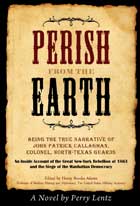Volume 31 Number 4 Spring/Summer 09
In this Issue
Features
- Family Squabbles
- Confronting Conformity
- Caution, Not Crisis
- Tooning Up
The Editor's Page
- Boiling Points
- Letters to the Editor
Along Middle Path
- Moon Walking at Philander's Phling
- Nayef Samhat Appointed Provost
- In and Out at Kenyon
- Kenyon in the News
- The Hot Sheet
- A Stitch in Time for Winter
- Gambier is Talking About...
- Sound Bites
- What's your Kenyon Quotient?
Sports
- Imagine
- Sports Round-Up
Books
- How the South Won
- Reviews
Office Hours
- Kenyon bids farewell to four veteran professors
- Transformed by time
- Not in my Job Description: Radio Nights
- Burning Question for Jay Corrigan, Associate Professor of Economics
Alumni News
- Sparking Sparks
- Singing from the Roots
- Obituaries
- Alumni Digest
The Last Page
- Un-Kenyon
- The Back Cover
How the South Won
Related Stories
Read an excerpt from Perish from the Earth.
 Perish from the Earth is the story of the famous John Patrick Callaghan, in his own words. You say you haven't heard of John Callaghan? That's because you don't inhabit the bleak parallel universe that Perry Lentz has created in this extraordinary counterfactual novel. Although the work offers many delights, at its heart sits the proudly self-serving memoir of the shrewd man who, more than any other person, engineered the victory of the Confederacy in the Great American War (1861-65).
Perish from the Earth is the story of the famous John Patrick Callaghan, in his own words. You say you haven't heard of John Callaghan? That's because you don't inhabit the bleak parallel universe that Perry Lentz has created in this extraordinary counterfactual novel. Although the work offers many delights, at its heart sits the proudly self-serving memoir of the shrewd man who, more than any other person, engineered the victory of the Confederacy in the Great American War (1861-65).
Discovered in 1876, the memoir receives its authoritative publication in 1880 just as the U.S.A. and the C.S.A. are resuming their armed contention for dominance in North America. The scholarly apparatus that provides the context for the manuscript is written by Henry Adams, the chief historian at West Point; and it allows the reader to discern the shadows of the world Callaghan has wrought—a thugocratically racist C.S.A. that terrorizes its chattel slaves under faux-aristocratic rule, a Prussianized U.S.A. that accepts sharp limitations on civil liberties to assure New Republican dominance, and a world whose elites have concluded that the grand historical experiment in self-government begun in 1776 has dead-ended in failure. Which is the point of the ironic title that Adams, borrowing from a belittled speech by the despised Lincoln, chooses for Callaghan's memoirs: Perish from the Earth.
John Callaghan is an unforgettable figure. Raised an Irish lad in New York City in the 1840s, shaped by tales of Wolfe Tone and the indomitable Bonaparte, he later becomes a railroader in Alabama. War offers destiny-shaping opportunities to this amoral and obsessive man, and after service in the army of the C.S.A. he agrees in 1863 to return to New York to work undercover for the South. Anticipating Irish opposition to conscription, he creates an apparatus of agents who turn resistance to the draft into—and here is where the story takes its counterfactual turn—successful rebellion against the government. Although the bloody uprising is put down, the stain placed upon Lincoln's administration by the savagery of the suppression is so indelible that McClellan wins the presidential election of 1864 and, to end the war, recognizes Southern independence and hands freed slaves back to the Confederacy.
Lentz's intricately constructed novel works at many levels. It is a rip-snorting narrative of politics, racial hatred, religious contempt, love, sex, brutality, espionage, warfare, and male bonding. It is a study of the dissolution of a single man and of a civilization. And because it speaks in many discrepant voices—Callaghan's various strains, of course, but also Adams's measured tones, and the bureaucratese of several others—it is a manuscript constantly prodding the reader to question its inherent reliability. Perry Lentz has given us a magnificent novel.
—Reed Browning, professor emeritus of history
Gambier, Ohio 43022
(740) 427-5158

 Delicious
Delicious Facebook
Facebook StumbleUpon
StumbleUpon Digg
Digg reddit
reddit